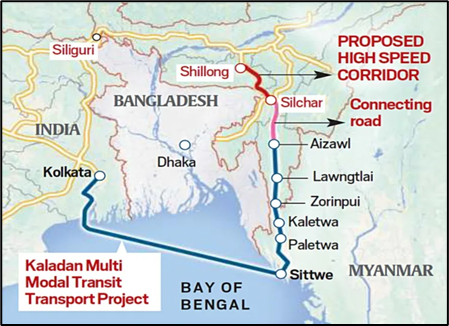Why in News?
India is planning a new highway from Shillong (Meghalaya) to Silchar (Assam) as part of a broader multi-modal transport project connecting to Myanmar, which will create a sea route to Kolkata that bypasses Bangladesh.
This move is seen as a strategic response to Bangladesh’s interim leader Muhammad Yunus, who recently claimed that Northeast India is “landlocked” and relies on Dhaka as its only ocean gateway.
In response, PM Modi, during a meeting with Yunus at the BIMSTEC Summit, cautioned against divisive rhetoric.
What’s in Today’s Article?
- Kaladan Multi-Modal Transit Transport Project
- Strategic Highway to Transform North-East Connectivity
Kaladan Multi-Modal Transit Transport Project (KMTTP)
- The KMTTP is a strategic infrastructure initiative undertaken by India, aimed at enhancing connectivity between the eastern Indian seaport of Kolkata and the landlocked North-Eastern states via Myanmar, bypassing Bangladesh.
- The project is jointly developed by India and Myanmar and is a key component of India’s Act East Policy.
- Different Legs of the Project
- Sea Leg
- From Kolkata Port (India) to Sittwe Port (Myanmar) via the Bay of Bengal.
- Distance: ~539 km by sea.
- Sittwe Port has been constructed by India.
- Inland Waterway Leg
- From Sittwe to Paletwa via the Kaladan River in Myanmar.
- Distance: ~158 km.
- Road Leg
- From Paletwa to Zorinpui (on the India-Myanmar border in Mizoram).
- Distance: ~110 km.
- Indian Leg (Planned Extension)
- From Zorinpui to Lawngtlai, and further to Aizawl in Mizoram.
- To be connected to India's highway network.
- Benefits
- Bypasses Bangladesh: Reduces dependency on access through Bangladesh for North-East connectivity.
- Improves Connectivity: Offers an alternative route to the Siliguri Corridor (Chicken’s Neck), the narrow strip that connects North-East India with the rest of the country.
- Boosts Trade & Commerce: Enhances trade flow between India and South-East Asia.
- Strategic Significance: Strengthens India’s presence in the Bay of Bengal and deepens ties with Myanmar.
- Economic Development: Spurs infrastructure development and economic activities in India’s underdeveloped North-Eastern region.
- Part of Act East Policy: A critical step in India’s efforts to improve connectivity with ASEAN countries.
Strategic Highway to Transform North-East Connectivity

- A 166.8-km four-lane high-speed highway is being constructed from Mawlyngkhung (near Shillong) to Panchgram (near Silchar) along NH-6.
- It is the first high-speed corridor in the North-East and the first such project in a hilly region, to be completed by 2030.
- The project is implemented by NHIDCL for MoRTH and was approved by the Union Cabinet at a cost of Rs 22,864 crore.
- Infrastructure Details
- The project will be executed in Hybrid Annuity Mode (HAM) under the PPP model.
- HAM is a project delivery model used in India, particularly for national highway development.
- It combines elements of both the Engineering, Procurement, and Construction (EPC) and the Build, Operate, and Transfer (BOT) models.
- It involves the government providing a portion of the project cost (40%) as construction support, while the remaining 60% is financed by the private developer through a pre-fixed annuity payment.
- This model aims to reduce financial risk for developers and speed up project execution.
- It will feature:
- 19 major bridges, 153 minor bridges, 326 culverts
- 22 underpasses, 26 overpasses, 8 limited-height subways
- 34 viaducts to navigate the hilly terrain.
- Key National and Strategic Significance
- The highway will reduce travel time between Shillong and Silchar from 8.5 hours to 5 hours.
- It will connect Silchar — a key entry point to Mizoram, Tripura, Manipur, and the Barak Valley — and act as a major regional link.
- It supports India’s Act East Policy by enhancing connectivity to Myanmar and beyond.
- The project is expected to reduce dependence on the Siliguri Corridor (Chicken’s Neck) and bypass Bangladesh, offering an alternative route via the Kaladan Multi Modal Transit Transport Project.










